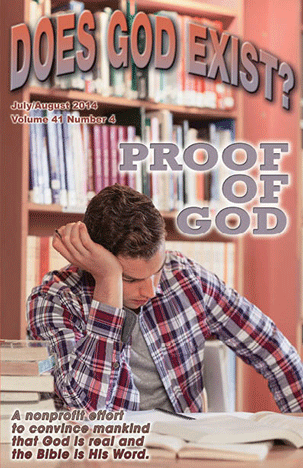Return to July/August 2014 articles.


For a number of readers of this journal, the title of this article is offensive. There are generally two groups that will object to it. The first group is the skeptic element of our readers who will say that the existence of God can never be proven because of its nature. The idea is that no experiment can be conducted with rigorous scientific method which can test whether or not God exists. The term used to describe this process is called falsification. Webster describes “falsify” as “to show to be unfounded or untrue.” Since the concept of God cannot be falsified, any idea of “proof” is said to be an ignorant proposal.
Philosophical battles have raged for as long as man has discussed this topic, but what is being described as “proof” is “absolute proof.” The bottom line is that none of us lives with absolute proof of anything. In fact, such a notion does not exist in science. Isaac Newton gave us proof that gravity is a function of mass. You can hang two large bags of sand next to each other and measure the angle of the strings carefully and you will find they are pulled toward each other. With a little vector algebra you can measure the force between the bags that is causing the bags to move, and from that you can show that the force is accurately described by the equation:

F is the force, m1 is the mass of one bag, m2 is the mass of the other bag, and d is the distance between them. To make the equation work G, a proportionality constant for gravity, is needed. This is 6.67 x 10-11. This experiment is, in fact, part of the public high school science curriculum.
Does this mean gravity being a property of mass has been absolutely proven? The answer is NO! Albert Einstein was able to show evidence in experiments that gravity is actually a product of the shape of space. Einstein’s description gives better explanations of some observations than did Newton's — such as the movement of the orbit of the planet Mercury. So has Einstein's concept of gravity been absolutely proven? The answer is NO! New measurements and better understandings of the nature of waves and space are now suggesting a way of modifying Einstein's ideas to an even better explanation of gravity, which may result in new technologies.
Quantum mechanics has challenged many understandings of science that had been considered proven. This is the nature of science. It is how science works. We come to new understanding by continuing to look at new evidence and re-examining old evidence. Absolute proof does not exist in science. When there is massive evidence that an understanding is correct, we call it “proof,” realizing there may always be changes and new understandings.
The second group that opposes the use of the word “proof” in reference to the existence of God is the religionist. The objection in this case is that if you say you have proven the existence of God, then you have eliminated faith. Once again, the absolute nature of our proof is an issue. God has never called us to absolute blind faith. When Thomas was consumed with doubt about the resurrection, Jesus provided him with evidence. 1 Peter 3:15 tells us to “be ready to give an answer to every man who asks of the reason of the hope that is within you.” Numerous biblical passages call believers to use evidence to validate faith (see Psalm 19:1; Psalm 139:14; Romans 1:18-22). What we are called to is a reasonable faith. Offering evidence simply strengthens our beliefs, but faith is never eliminated. The miracles of the Bible are always accepted or rejected on the basis of faith. The virgin birth, the resurrection, and other miracles are accepted or rejected on faith.

When we talk about proof in any common sense, we are talking about the weight of the evidence. When you drive your car down the highway, you have no absolute proof that someone will not cross the center line, hit you head on, and kill you. The evidence is, however, that this is a very rare event, so you have enough proof that you will not be killed in this way as you drive your car. In the same way, we have proof of the existence of God. There is massive evidence that God does exist. The purpose of this journal has been and continues to be to present a small sampling of each of these areas. These include the following:
CREATION
The formation of time, space, and matter/energy requires a creative source that exists in a higher dimension than these quantities. Elaborate higher dimensional entities such as superstrings, multiverses, and branes have been proposed, but those ideas are untestable. Sometimes proposals like superstrings have mathematical equations that seem to fit the model. However, there are 10 500 different possible solutions to these equations, so they are not a practical proof that superstrings exist. There are properties of the cosmos that suggest an intelligence was involved, eliminating pure naturalism as a reasonable belief system for the creation of the cosmos. (See January 1978, May/June 1987, and May/June 2002 issues of this journal for more information on this concept.)
DESIGN EVIDENCE
The evidence for intelligence involved in the creation can be approached in a variety of ways. Design is not a scientific method, but rather an apologetic, or proof of God. The alternative to believing that an intelligence was a part of the cause of the cosmos is to believe that it could occur by chance. The number of parameters involved in the formation of anything in the physical universe has turned out to be huge. When statistical methods are applied to the question of whether or not chance is a reasonable proposal, the probabilities make chance difficult to accept. There is also a question as to whether the observer effects chance processes.
Calculations by atheists and believers alike show that the number of parameters necessary for life to exist on a stable planet is huge. That makes the probability of all of them coming into existence by chance alone so unlikely that chance cannot be a reasonable explanation. We have 47 such parameters available in an article titled “Evidences for Design in the Universe.” (This booklet is available upon request, and is also on our doesgodexist.org website.) Numerous books have been written on this subject, but all of them come up with probabilities of one chance in 10 800 power or more. That is far beyond the scientific Dirac limit of what can be considered possible.
Attempts to circumvent this problem by atheist authors by inventing models of multiple or parallel universes fail. This is because not only do all of the parameters have to be at the same time, but they have to be at the same place in space/time.
ONTOLOGICAL EVIDENCE
Ontology relates to the nature or essence of being or existence. A definition of ontology says that it involves investigations of experiences, either beyond the sphere of the present world or in any other way incapable of being the direct object of consciousness, which can be deduced immediately from the possession of certain feelings or principles and faculties of the human soul.
On a very practical level, the question is why do sentient beings conceive the idea of God? Why do we choose to worship God? What is it that causes humans universally to formulate some concept of the supernatural?
In addition to the question of why humans worship God, ontological evidence also centers around what it is that gives us the ability to create art and to express ourselves in music. There have been elaborate efforts to ascribe artistic and musical expression to some animal behaviors. In spite of our tendency toward anthropomorphic understandings of animal behavior, new scientific data shows otherwise. The artistic works and musical expressions of animals have better explanations in terms of survival techniques than in art expression for the joy of creativity. The cardinal singing beautifully outside your bedroom window is not just composing music as Mozart did, but is in reality warning all other competitors to stay out of his territory. Whale singing is communication, not artistic expression of emotions.

In addition to ontological questions about the origins of creativity and worship, there are similar questions about feelings of guilt, sympathy, and compassion. Dogs do not cower because they have feelings of guilt, but rather because they have learned it is a way to survive when they have offended. It is important to understand that these expressions are not a function of intelligence. Mentally challenged human beings show these characteristics, and very intelligent animals do not. Animals raised in human homes do not show these emotions unless such expression promotes their survival. Animals reverting to destructive animal behavior are very common — such as chimps raised in human homes suddenly attacking a guest or even the owner. Ontological evidence of these characteristics is strong and leads us to moral arguments.
MORAL EVIDENCE
Why do we have a definition of right and wrong? Why do humans engage in altruistic behavior? Can humans be moral without belief in a supreme being who provides a fixed set of laws to live by and to whom we must ultimately answer? Atheists like Richard Dawkins evade the problem of evil by simply saying it does not exist (see River Out of Eden, [New York: BasicBooks, 1995], page 133). There have been books written claiming atheism is void of moral stance (see Can We Be Good Without God? by Paul Chamberlain, Intervarsity Press).

If God created us and gave us a “field guide” on how to live with one another, the system he gave us should work and attempts to live with another set of instructions should not work. In fact, the evidence is strong that attempts to build a morality, without faith in God simply does not work. When atheists have tried a social experiment of having a town or a society where no religious values are allowed, the result has been negative time and again. Liberal, Missouri, is a famous American example where the town was built with no churches of any kind being allowed. In the book This Strange Town: Liberal Missouri (see information at this site: http://evermore.imagedjinn.com/blg/) J.P. Moore details the collapse of the community because of a lack of absolute values of right and wrong. Our ministry has an extensive correspondence course program available in prisons. When we get into the lesson on morality and making moral choices one of the most common comments I hear from prisoners is that if they had studied the proof of God's existence years before, they would not be in prison now. Their violation of the law stemmed from having no religious foundation of right and wrong. Survival of the fittest is not a viable way to base moral beliefs and practices. When religious people do something immoral, they do so knowing they violated what they know is right and wrong. The guilt and emotional scars from this are baggage they struggle with for their entire lives. Atheists have no such baggage because they have denied that there is such a thing as evil and wrong.
INSPIRATIONAL EVIDENCE

If the Bible shows inspiration, there has to have been an “inspirer.” The wisdom and practical value of living as Christ calls us to live is shown in changed lives, in charity and relief work, in the promotion of education, in the arts, in medical relief, in care facilities, and in social work. Biblical minimalists have failed miserably in their attempts to discredit the Bible, showing massive ignorance and poor scholarship in the process. (For details on this see “Maligning God in Ignorance” in our January/February 2009 issue. Also see The Dawkins Delusion by Alister McGrath.)
Atheist complaints about the Bible fall into one of six categories:
- Theological and philosophical objections to God's actions. Questioning why God did something, or whether we like what God did in ancient Israel is not an indictment of the Bible as being fraudulent.
- Misunderstanding characteristics of God. God being a jealous God, for example, does not mean that God is like a child, mad because someone has something he does not. God's jealousy is over the unfaithfulness of his people. It is like a man being jealous when his wife is unfaithful to him. It is a rejection of God in spite of all he has done for us in favor of a false substitute.
- Translation issues. We have to look at who wrote it, why they wrote it, to whom they wrote it, and how the people of the time would have understood it. Going back to the original language is frequently necessary to understand what is being said. The difference between God creating (Hebrew bara) and God making (Hebrew asah) in Genesis 1 has huge implications for our understanding of the message that is being given. Sometimes translation errors are also an issue — always easy to straighten out, but sometimes misleading.
- Not understanding the difference between the Old Testament and the New Testament. Charges of animal cruelty, misogynistic behavior, brutality, and polygamy are frequently made by Bible skeptics using Old Testament stories.
- Not understanding the difference between the physical and the spiritual in both events and in worship activity.
- Not recognizing the purpose of human existence.
In addition to these errors (and a variety of others that could be given) critics of the Bible neglect to look at the positive evidence. A wide range of scientific statements are made and implied in the Bible that are beyond the knowledge of the authors and cannot be ascribed to chance. The essential nature of blood (Leviticus 17:11-14), the practice of quarantine (Leviticus 13-15), hygienic laws (Deuteronomy 23:12-14), the sequence of the creation in Genesis 1, Spencer's scientific principles given in Genesis 1, the water cycle, and a variety of psychological issues are all a testimony to the fact that there is a uniqueness to the Bible that sets it apart. (A listing of these and other examples are available upon request or are on the doesgodexist.org website in the Appendix A section (in PDF) of the correspondence course.)
The practical value of the Bible and what it has meant for mankind cannot be denied. Alvin J. Schmidt's book How Christianity Changed the World (Zondervan) does a wonderful job of showing what a positive influence for good the Bible has been. This does not happen unless there is a uniqueness to the book, and the Bible stands out as being so unique that it is difficult to ascribe it to the ancient work of ignorant men.

When scientists come to a conclusion about a natural phenomenon they do not do that based on one piece of evidence. Numerous experiments are conducted in a variety of disciplines over a very long period of time. As new evidence becomes available, it too is used to continue to analyze the understanding in question, or a change is made in the understanding. The proof of God’s existence is not based on one experience or one area of study. We have not discussed philosophical, psychological, historical, or other disciplines in which experts in those fields have offered evidence, but that kind of support continues to grow.
We can find enough evidence to build a dynamic faith that gives meaning to life, guides us in and through life's difficult times, and answers the challenges of those still searching for that proof that will move them to act. For some of us, not much evidence is needed, but for others we need to hear “the reason of the hope that is within you.” That proof God has given in a variety of ways, but perhaps the change it makes in the life of a lost soul is the most convincing proof of the reality of the existence of God.
Picture credits:
Cover and title photo: ©Wavebreak Media Ltd. Image from BigStockPhoto.com
© Iwona Grodzka. Image from BigStockPhoto.com.
© ChamilleWhite. Image from BigStockPhoto.com
© Andreyuu. Image from BigStockPhoto.com
© Willie Cole. Image from BigStockPhoto.com
© Creativa. Image from BigStockPhoto.com.
© VladisChem. Image from BigStockPhoto.com
